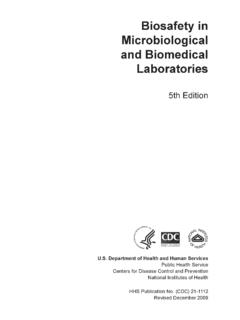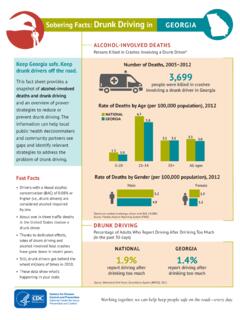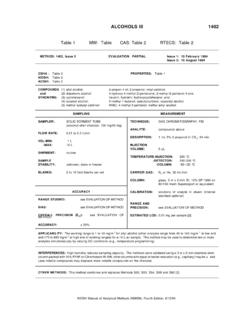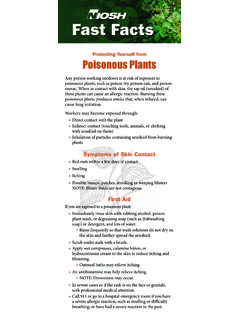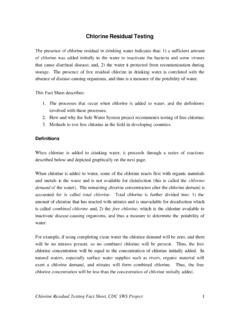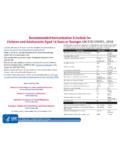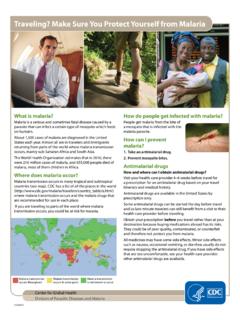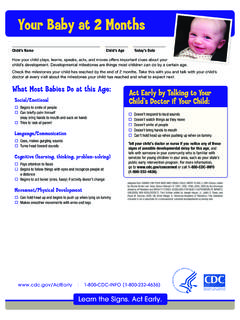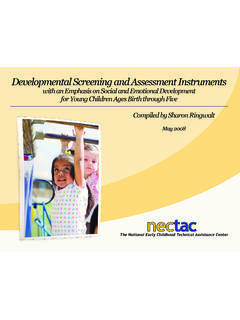Transcription of Developmental Screening/Testing Coding Fact Sheet for ...
1 Developmental Screening/Testing Coding Fact Sheet for Primary Care Pediatricians I. Coding . Developmental screening, surveillance, and assessment are often complemented by the use of special tests, which vary in length. This Coding Fact Sheet provides guidance on how pediatricians can appropriately report limited and extended Developmental screening and testing services. A. How To Report Developmental Testing 96110 Developmental testing; limited (eg, Developmental Screening Test II, Early Language Milestone Screen), with interpretation and report The use of Developmental screening instruments of a limited nature (eg, Developmental Screening Test II, Early Language Milestone Screen, PEDS, Ages and Stages, and Vanderbilt ADHD rating scales) is reported using CPT code 96110 ( Developmental testing.)
2 Limited). Code 96110 is often reported when performed in the context of preventive medicine services, but may also be reported when screening is performed with other evaluation and management (E/M) services such as acute illness or follow-up office visits. On the 2005 Medicare Fee Schedule (Resource-Based Relative Value Scale or RBRVS), the Centers for Medicare and Medicaid Services (CMS) published a total relative value unit (RVU) of for 96110, which amounts to a Medicare payment of $ ( x $ {Medicare 2005 conversion factor} = $ ). Because an office nurse or other trained non-physician personnel typically performs the service, this relative value reflects only the practice expense of the office staff and nurses, the cost of the materials, and professional liability -- there is no physician work value published on the Medicare physician fee schedule for this code.
3 On the less common occasion where a physician performs this service, it may still be reported with code 96110 but the time and effort to perform the testing itself should not count toward the key components (history, physical exam, and medical decision making) or time when selecting an E/M code for a significant, separately identifiable service performed during the same patient encounter. When a limited screening test is performed along with any E/M service (eg, preventive medicine or office outpatient), both services should be reported and modifier -25 (significant, separately identifiable evaluation and management service by the same physician on the same day of the procedure or other 1/20/05.)
4 1. service) should be appended to the E/M code to show the E/M service was distinct and necessary at the same visit. 96111 Developmental testing; extended (includes assessment of motor, language, social, adaptive and/or cognitive functioning by standardized Developmental instruments) with interpretation and report Extended Developmental testing using standardized instruments (eg, Bayley Scales of infant Development, Woodcock-Johnson Tests of Cognitive Abilities (Third Edition) and Clinical Evaluation of Language Fundamentals (Fourth Edition)) are reported using CPT code 96111. This service may be reported independently or in conjunction with another code describing a separate patient encounter provided on the same day as the testing (eg, an evaluation and management code for outpatient consultation).
5 A physician or other trained professional typically performs this testing service. Therefore, there are physician work RVUs published on the Medicare physician fee schedule (Resource-Based Relative Value Scale or RBRVS) for this code. In 2005, code 96111 has total RVUs, which calculates to a Medicare payment of $ ( x $ {Medicare 2005 conversion factor} =. $ ). When 96111 is reported in conjunction with an E/M service, the time and effort to perform the Developmental testing itself should not count toward the key components (history, physical exam, and medical decision making) or time for selecting the accompanying E/M code.
6 Just as discussed for 96110, if the E/M code is reported with 96111, modifier 25 (significant, separately identifiable evaluation and management service by the same physician on the same day of the procedure or other service) should be appended to the E/M code or modifier 59 (distinct procedural service) should be appended to the Developmental testing code, showing that the services were separate and necessary at the same visit. In 2005, the CPT code descriptor of 96111 was revised to reflect the deletion of the test examples as well as the "per hour" designation. Thus, starting January 1, 2005, physicians will report the service without regard to time.
7 The typical testing session, including the time to perform the interpretation and report, was found in the American Academy of Pediatrics (AAP) survey used to value the service to be slightly over an hour. B. When To Report Developmental Testing 96110. The frequency of reporting 96110 is dependent on the clinical situation. The AAP. Recommendations for Preventive Pediatric Health Care schedule recommends Developmental /behavioral assessment at each preventive medicine visit, and the AAP. 1/20/05. 2. Developmental Surveillance and Screening of Infants and Young Children policy statement recommends that physicians use validated Developmental screening tools to improve detection of problems at the earliest possible age to allow further Developmental assessment and appropriate early intervention services.
8 Thus, the use of screening tests of a limited nature seems to enhance the task of Developmental assessment typically done in the preventive medicine setting. The exact frequency of testing therefore depends on the clinical setting and the provider's judgement as to when it is medically necessary. When physicians ask questions about development as part of the general informal Developmental survey or history, this is not a "test" as such, and is not separately reportable. Examples of validated limited screening tests along with clinical vignettes are provided below. 96111. Longer, more comprehensive Developmental assessments of patients suspected of having problems are typically reported using CPT code 96111 ( Developmental testing; extended).
9 These tests are typically performed by physicians or psychologists and require upwards of an hour of time. They also are accompanied by an interpretation and formal report, which may be completed at a time other than when the patient is present. Like code 96110, the frequency of reporting code 96111 is dependent on the needs of the patient and the judgment of the physician. When Developmental surveillance or screening suggests an abnormality in a particular area of development, more extensive formal objective testing is needed to evaluate the concern. In contrast to adults, the limited ability of children to maintain focused selective attention and testing speed may mean that several sessions are needed to properly evaluate the problem.
10 Code 96111 is reported only once the testing and its accompanying report are completed. Additionally, subsequent periodic formal testing may be needed to monitor the progress of a child whose skills initially may have not been significantly low, but who was clearly at risk for maintaining appropriate acquisition of new skills. II. CLINICAL VIGNETTES. 96110 Vignette #1. At a 24-month well child check, the mother describes her toddler as "wild, completes the PEDS (Parent Evaluation of Developmental Status), and responds positively to the question Do you have concerns about your child's language skills?

